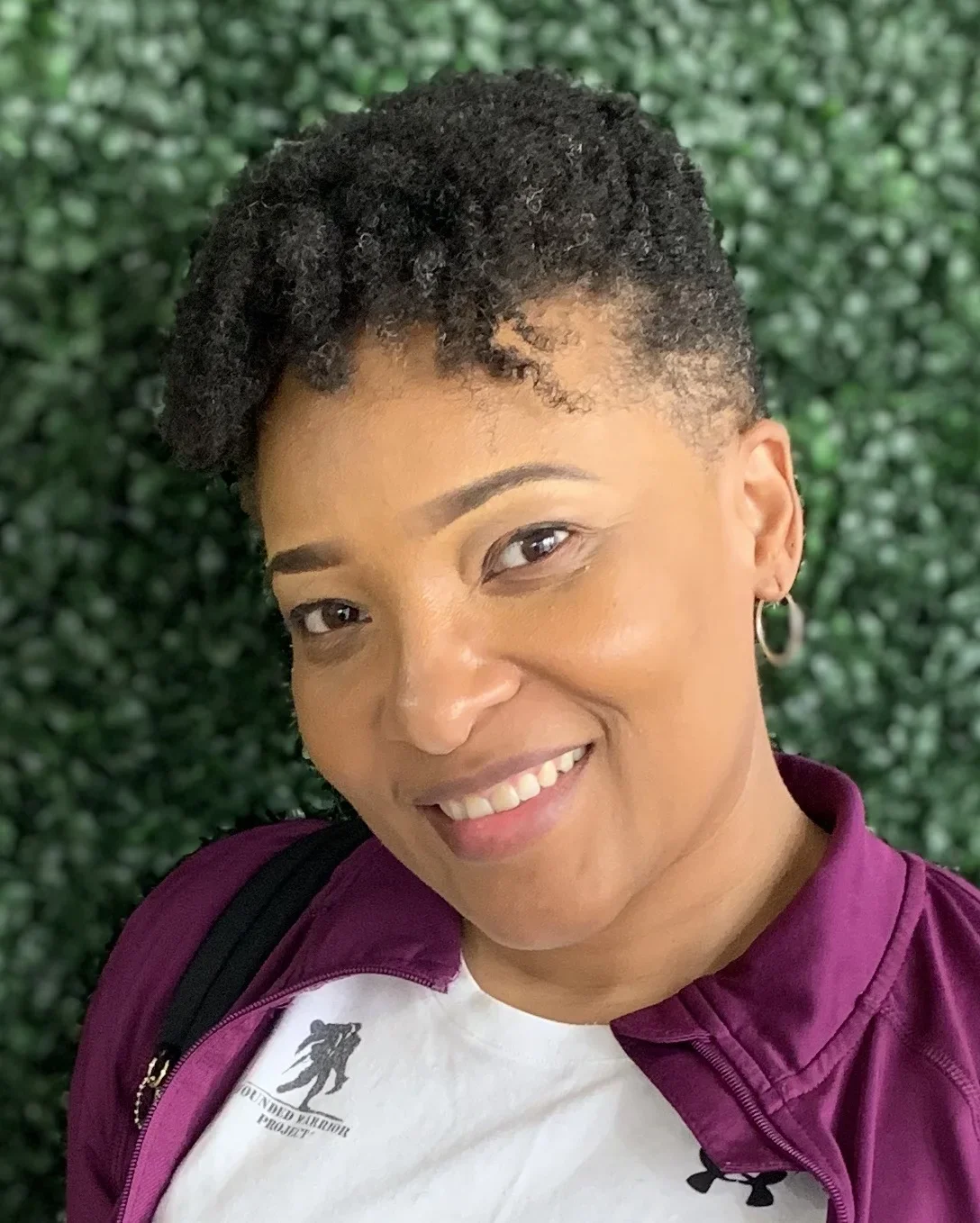Teak Safiya Wilson
MVP Has Become My Family
“I wasn’t a good student in high school, but I excelled in track and tennis, and I wrestled. I wanted to join the Marines, but I got a track scholarship instead, so I went to college. I lost the track scholarship when I saw my teammates were more talented than I was, and I got a tennis scholarship instead.” Teak attended Grambling State University in Louisiana—"the best Historically Black College and Universityin the nation.” She graduated in 2001 with a degree in Criminal Justice, with plans to continue on to law school. At the time she couldn’t afford law school and did a variety of odd jobs: selling vacuum cleaners, state prison correctional officer, mailroom coordinator at an insurance company and a flight attendant. “Life wasn’t going in a good direction, and I thought that joining the military might be a push in a better direction.”
“When I was working as a police officer, many of my coworkers had been in the military. I was 27, and I thought by joining the National Guard, I could ‘play army’ one weekend a month and two weeks in the summer, help my resume with better job options, pay off my student loans and get my law degree with the GI Bill. The contract I signed said I wouldn’t be deployed for two years, but they didn’t stick to the contract or pay off my student loans.”
Teak was raised in San Diego with three brothers by her mother; she has a half-sister by her father. Her grandparents came from Trinidad and Barbados. Her dad grew up in New York and her mother in Rhode Island. Her father had been in the Navy, but “I wasn’t patriotic or had ever dreamed about a military career; it was a means to an end.” After basic training, she was sent to Fort Sam Houston, Texas, for 17 weeks of training to become a combat medic. “After 16 weeks of training, I couldn’t pass the National Registry Test, so I had to be reclassed. I had two choices: Light Wheel Mechanic or Unit Supply (Logistics) and when I initially chose Light Wheel Mechanic my sergeant discouraged me from that choice, she said I would be better suited for Logistics, so I went to Fort Lee in Virginia for two more months of training in logistics. After a 4-month stint in Georgia, my unit deployed to Afghanistan in 2009.”
“Going to Afghanistan ended my career. Not long after I got there, I was at the end of my overnight duty, and I lost my footing and fell down the guard tower stairs, breaking both ankles and feet. I went to the medic and was sent back to duty. Even though my ankles felt weak, I tightened my boots and, I kept on going. In BASIC, my drill sergeant once told us: ‘If it’s not bleeding or protruding—keep on moving.’ If I didn’t see it, I didn’t notice.” During her ten months in Afghanistan, she experienced several traumas that basically went untreated. A blast from a vehicle outside the PX caused trauma to her hearing. “A second time the stairs and I just didn’t get along, I wasn’t paying attention while fastening my sidearm and slipped on some ice at the top of the stairs—hitting every step—and I fell down them hard. A couple of days later, I was stiff and black, blue, and purple.”
“After my deployment and I was sent back stateside, I finally got X-rays and a full body scan. The doctor asked me to walk for him—normal tendons and ligaments are attached to something—mine were severed, and bones were floating. ‘I don’t understand how you’re standing up.’ I spent my last 11/2 to 2 years between Fort Stewart and Fort Gordon, both located in Georgia until I was medically retired in 2013. I am 100% disabled and have had two surgeries on each foot and sustained a Traumatic Brain Injury. I came back with a stutter, and I spent three months at SHARE Military Initiative, an in-house treatment program within the Shepherd Center for Spinal Cord and Brain Injury in Georgia, for speech, occupational therapy, and learning how to talk and walk again and with new coping skills.”
“I earned a Personal Training Certificate, mainly to learn how to adapt to my physical limitations. I just started working for the Georgia Department of Veterans Services as an Appeals Officer. I help veterans get the benefits they’ve earned. I also volunteer with the Wounded Warriors Project, where I lead several groups in peer to peer interaction; I am certified in suicide prevention.” After receiving so much help with her own transition from various Veteran Service Organizations, she decided to pay it forward by helping other veterans with their transition back into civilian life.
“I heard about MVP from Jarrad Turner, and I went to a Super Bowl event at the Atlanta center. I met Jay Glazer, MVP founder, and he was a great guy. The following week I went to a meeting, and although it had been canceled, the gym owner Coach Manu, welcomed us to stay and workout anyway. I felt very comfortable and developed a great rapport and a connection with the people there, and I looked forward to seeing them again. I made new friends at MVP who helped me get through the rest of my week. I’m usually a loner in big crowds, but I was able to talk a little bit more in smaller groups.”
“I was medically retired at the age of 33. Now that I’m almost 40, it’s not where I thought I would be at this age, but life is good. I’m in a relationship, I’m working in a job that I love, and MVP has become my family.”

